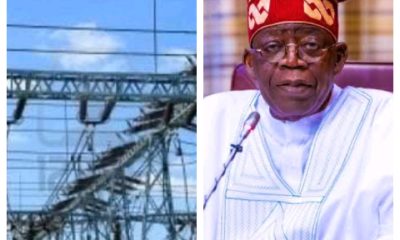Editorial
E-EDITIONS COLUMNS July 20, 2023. Student Loans Law: Tinubu’s Populist and Half-baked Policy, By Olu Fasan.

E-EDITIONS
COLUMNS July 20, 2023
Student loans law: Tinubu’s populist and half-baked policy, By
Olu Fasan
BOLA Tinubu,Nigeria’s new president, was determined to hit the ground running from his first day in office. He was haunted by the ghost of his somnolent predecessor, Muhammadu Buhari, who sat desultorily on his hands, doing nothing for the first six months of his administration in 2015. Unlike Buhari, who was called, and relished being called, “Baba Go Slow”, Tinubu has been called, and enjoys being called,“Baba Go Fast”! But, in governance, going fast can be as bad as, even worse than, going slow.
This is because good government depends on good policy making, and good policy making requires thoughtfulness, proper planning and a comprehensive analysis of the problem. However, Tinubu has shown a penchant for populist and half-baked policies. Populist, because they’re eye-catching and intended to show he cares about ordinary people; half-baked, because they’re poorly thought through, and defy basic rules of good policymaking.
Recently, I criticized Tinubu’s arbitrary withdrawal of the fuel subsidy without proper planning and consultation. The subsidy removal has not only affected the “rich”, but, more so, the poor, who bear the brunt of the pass-through costs through sky-rocketing inflation that will further immiserate them. But what did Tinubu do? Last week, he announced a N500 billion “palliatives” to give N8,000 to 12 million people monthly for six months.
First, how did Tinubu arrive at the 12 million figure when 133 million Nigerians are multidimensionally poor? Second, what would N8,000 per month do for a poor Nigerian, with an ever-rising cost of living? And third, why six months? The fuel subsidy removal would save the government $10bn, over N8 trillion, per year. But Tinubu wants to give 12 million Nigerians a measly N8,000 per month for six months. Faced with a backlash, he’s now reportedly reviewing the palliatives. It’s a damning indictment of his rash governing style.
Which brings us to the student loans policy. Tinubu signed the Student Loans (Access to Higher Education) Bill into law on June 12. In a four-part article in this newspaper, entitled “Education loan for students by President Tinubu”, the legal icon and renowned educationist Chief Afe Babalola, SAN, founder of Afe Babalola University, extensively examined the new law and gave it the thumbs down! Chief Babalola’s analysis is unassailable.
For me, the act confirms a pattern of deceptive populism and half-baked policy making. Indeed, Tinubu, who has long been part of Nigeria’s problem, and whose party has misruled Nigeria since 2015, is now insulting Nigerians with deceptive invocations of populism. Recently, he said he would “recover Nigeria from vested interests”, citing the student loans act as evidence of how he’s doing so.
But if the student-loans law is, indeed, intended to support indigent students, then it’s a bad law and an ill-conceived, harebrained policy. Yet, Dele Alake, Tinubu’s special adviser on “special duty, media, communication and strategy”, said: “This is how it is done in other developed climes.” Really? How many student-loans laws in other countries did the Tinubu administration study before introducing its own flawed legislation?
First, there’s no evidence of a comprehensive analysis of the problem. Giving loans to poor students in a tertiary education system that lacks the resources and capacity to produce employable graduates is misguided. With graduate unemployment ranging between 40 and 60 per cent, depending on whether the qualification is a degree or an HND, poor students would be saddled with huge debts with little prospects of getting a proper job after graduation to pay them back.
In the UK, the student loans scheme was linked to raising the tuition fee to £9,250 per year, allowing universities to generate more income. And as they generated more income, they spent it on enhancing teaching, research and the student experience, resulting in better qualified and employable graduates. So, giving loans to poor students without significantly resourcing and improving Nigeria’s tertiary institutions would simply increase student population and graduate unemployment. Furthermore, a student loan that covers only tuition, as the act says, and not maintenance, as in the UK, doesn’t really help the poor!
Then, there’s the utter deception. The act says its aim is to “provide easy access to higher education for indigent students”. Yet, it puts major obstacles in their way. First, an applicant’s family annual income must be less than N500,000. Every good policy is inclusive, excluding no sections of society from its benefit. But Tinubu’s student loans policy excludes millions of poor families: a family is now considered rich in Nigeria if its annual income is N500,000 ($650)!
Ridiculously, every applicant must also produce two guarantors. Tell me, in a country where getting anything virtually depends on connections or palm-greasing, why should an indigent parent or student be burdened with looking for a senior civil servant, a senior lawyer, a judicial officer or a justice of peace as guarantors?
What’s more, if an applicant has a parent who has defaulted in respect of a student loan or any other loan, he or she would be disqualified. Thus, Tinubu visits the sins of parents on their children. Furthermore, an applicant would be disqualified if he or she has been convicted of drug offences. How ironic, given that Tinubu himself was entangled in a drug related matter in the US.
Here’s the point. The eligibility and disqualification conditions in the act negate the so-called aim “to provide easy access to higher education for indigent Nigerians.” So is the exclusion of students in private tertiary institutions from benefitting from the loan. In the UK, tuition fee loans are for all students, while maintenance loans and grants are means tested. If the Tinubu government cannot afford a universal student loans scheme, it shouldn’t create such a discriminatory scheme that excludes large sections of society. That’s bad policy and may be even unconstitutional, as some senior lawyers argue!
Outrageously, the act provides that a student-loan defaulter “shall be liable to imprisonment for two years or a fine of N500,000”. How many of the politically-connected farmers who defaulted in their Anchor Borrowers’ Programme loans are in jail? No civilised society treats student-loan default as a jailable offence. Besides, student loans are not conventional loans, hence many governments make provisions for cancellation. Yet, Tinubu trumpets his perverse student loans act as an achievement. It betrays his deceptive populism and penchant for capricious, ill-judged policymaking. Call it bad governance
Editorial
Is Dubai A Country? Inside the Seven Kingdoms of the United Arab Emirates

By: Editorial Team
The United Arab Emirates (UAE), often hailed as a beacon of modern development in the Middle East, is a federation of seven emirates—each with its own distinct history, ruler, and cultural identity. Since its unification in 1971, the UAE has stood as a rare example of how traditional monarchies can collaborate to build a stable and globally respected nation.
At the heart of the federation lies Abu Dhabi, the capital and largest emirate, known for its vast oil wealth and political influence. The Al Nahyan family, which leads Abu Dhabi, has played a central role in shaping the UAE’s national vision and foreign policy. The current President of the UAE traditionally comes from this emirate, underscoring its leadership within the union.
Dubai, the shining star of the federation, represents ambition and innovation. Under the leadership of the Al Maktoum family, Dubai has transformed from a desert outpost into a global hub for finance, tourism, and technology. Its breathtaking skyline, led by the Burj Khalifa, has become a symbol of Arab progress and resilience.
Moving beyond the two powerhouses, Sharjah distinguishes itself as the cultural and educational capital of the UAE. Led by the Al Qasimi family, it has preserved the emirates’ artistic heritage while promoting academic excellence through its numerous universities and museums.
The smaller emirates-Ajman, Umm Al-Quwain, Ras Al Khaimah, and Fujairah-each add unique character and strength to the federation. Ajman, the smallest, thrives on trade and manufacturing; Umm Al-Quwain offers a peaceful charm along its quiet shores; Ras Al Khaimah, nestled against the Hajar Mountains, is known for its natural beauty and growing industrial base; and Fujairah, facing the Gulf of Oman, plays a strategic maritime role in the region’s economy.
Despite their differences in size and resources, the seven emirates remain bound by shared values, mutual respect, and visionary leadership.Their collective success story reflects not only unity but also the ability to balance tradition with progress.
Over five decades after its founding, the UAE continues to prove that cooperation among monarchies can yield a modern, forward-looking state-one that honors its past while boldly stepping into the future. The federation’s model of governance offers an enduring lesson in leadership, stability, and nation-building in a region often defined by division.
Photo Credit: shuterstock
Editorial
The Modern Avatar of Agadagba

Editorial – IduwiniVoice
Government Oweizide Ekemupolo is 4th Century descendant of The progenitors of the Oru tribe, the archetypal Ijaws, who settled in the central Niger Delta and over time, who developed and spread to the entire Niger Delta. He his an embodiment of the ancient and modern ways and forces of the ijaw ancestral greats, ruled my ancient spiritual and human laws, a man and a superman.
Prior to 1600 AD, the Ijaws first and formally formed city-states on their island of abode in Central Niger Delta. The city-states were named Agadagba-bou, Isomou-bou, and Opugla-bou. The popular city-state was called Agadagba-bou, which, according to history, flourished for 400 years until it got abandoned in 1050 CE. That was the period Ijaw people migrated within the central Niger Delta and spread to the Western and Eastern Niger Delta.
Agadagba-bou, Isomou-bou, and Upugla-bou, which represented the Ijaw civilization at the historical island, long before it was named Wilberforce Island, had cultural, spiritual, linguistic, and occupational homogeneity.
They were all worshippers and believers of the sky God. The sky God that the Ijaws call today, even from ancient times, is Egbesu. It is believed that the Wilberforce Island was known as a forest named after Agadagba, the most powerful chief priest of Egbesu, who also doubled as the military general of the Izon nation.
Agadagba-bou, as a nomenclature, derives its bearing from Agadagba, the chief priest and generalissimo who once reigned on the Wilberforce Island. It is certain that the island hosted the Ijaw nation long before the time of Agadagba because Agadagba was appointed a chief priest and military general during his time by a potentate ruler of Ijaw nation.
In the primordial mists of time, Agadagba, the illustrious military general and chief priest of Egbesu, strode forth from the hallowed grounds of Agadagbabou, his footsteps echoing through the annals of Ijaw history. This revered figure, a paragon of martial prowess and spiritual wisdom, embodied the dual essence of his people, wielding the sword and the sacred staff with equal aplomb. The whispers of the ancients tell us that Agadagba’s reign predated the 1600 AD, a bygone era when the Ijaw nation thrived in harmony with the rhythms of the Niger Delta.
Agadagbabou, the cradle of Ijaw civilization, slumbers beneath the weight of centuries, its sacred soil serving as the final resting place of the ancestral spirits. Here, the venerable dead lie entombed, their ethereal essences lingering, awaiting the supplications of their descendants. Alas, the diaspora of the Ijaw people has occasioned a lamentable disconnection from these archetypal forebears, a severance that has hindered the unfettered flow of ancestral blessings, those numinous benedictions that are the birthright of every society.
For it is an immutable truth that the progress of a people is inextricably linked to the approbation of their ancestors.
The epochs have passed, and Agadagba’s terrestrial sojourn has long since drawn to a close, yet the imperishable essence of this legendary figure endures, awaiting reification in the mortal coil. Behold, 4.18 CENTURIES AFTER AGADAGBA, PRICESELY FOUR CENTURIES PLUS, in this our age, Government Oweizide Ekemupolo, a worthy scion of the Ijaw nation, has arisen, invested with the sacred mantle of Egbesu’s chief priest and military general. The symmetries are striking, the correspondences unmistakable: Ekpemupolo stands forth as the avatar of Agadagba, a reincarnation of the primordial hero, reborn to reclaim the lost patrimony of his people.
As we gaze upon Ekpemupolo, we behold the rekindled flame of Agadagba’s indomitable spirit, a fiery essence that refuses to be extinguished. The mythopoeic imagination whispers secrets in our ear, intimating that this modern-day embodiment of Ijaw valour and spirituality is, in truth, a Priest of the ancient mysteries, a hieratic vessel ordained to restore the pristine glory of Agadagbabou and reestablish the vital link between the living and the ancestral dead.
Thus, the epicycle of time turns full circle, as the reincarnated Agadagba, in the person of Ekpemupolo, strides forth to reclaim his rightful place within the sacred precincts of Ijaw tradition. The word is a witness to his spiritual and endeavours which catalyse a renaissance of the Ijaw spirit, rekindling the ancestral fires that burn bright within the collective unconscious of this venerable people, and guiding them toward a future illuminated by the radiant glow of their archetypal forebears.
As Tompolo’s efforts continue to bear fruit, Nigeria’s economic landscape is transformed, and the nation’s people reap the benefits of his tireless endeavours. His legacy will forever be etched in the annals of Nigerian history, a shining testament to the power of visionary leadership and unwavering dedication to the nation’s progress.
Benedict Binebai is a Professor of African Literature, a Social Conscientizer, and a Critic of outstanding repute.
(c) IduwiniVoice
Editorial
A Magnificent Gesture of Philanthropy: Tompolo’s Landmark Donation 10 Billion Naira to Delta State Government

Editorial
Chief Tompolo’s most generous bestowal of 10 billion naira upon the Delta State Security Fund is a magnificent affirmation of his steadfast devotion to the betterment of his beloved homeland. This munificent act not only underscores his profound solicitude for the well-being of the citizenry, but also serves as a sonorous confirmation of his dedication to the edification of the nation.
This magnificent donation bespeaks Chief Tompolo’s perspicacious vision for a Delta State wherein the territorial integrity, individual safety, and proprietary rights of its inhabitants are zealously safeguarded and protected. For it is an immutable truth that security constitutes a fundamental pillar for peaceful and progressive human existence, and a people that get security right are a people who enjoy prosperity, stability, and tranquillity. His largesse constitutes a clarion call to all right-thinking Nigerians to emulate his exemplary conduct, thereby contributing to the realisation of a more stable and prosperous nation.
As a private individual, Chief Tompolo’s remarkable munificence distinguishes him as a true architect of society, a philanthropist of discerning taste, and a stalwart champion of both private and public institutions. His actions evince a profound comprehension of the intricate nexus between security, patriotism, and nation-building, and serve as a shining exemplar for others to follow.
In the pantheon of benevolent figures, Chief Tompolo’s deed resonates with the selfless generosity of mythical beings like Prometheus, who defied the gods to bestow the gift of fire upon humanity, or Hercules, who cleansed the Augean stables to bring prosperity to the land. Like these fabled heroes, Chief Tompolo’s philanthropy emanates a profound sense of altruism, illuminating the path towards a brighter future for the people of Delta State.
By this singular act, Chief Tompolo has floated a most compelling narrative that the Ijaw nation, and indeed all ethnic groups in Nigeria, have a critical role to play in shaping the country’s destiny. His donation is a puissant statement that the resources and talents of Nigerians, regardless of their region or ethnicity, can be harnessed to forge a more united, secure, and prosperous nation, and that the Ijaw people, in particular, are committed to contributing to the construction of a brighter Nigerian picture.
Chief Tompolo’s unprecedented gesture inaugurates a new paradigm of leadership for the Ijaw nation, one that radiates an unparalleled aura of generosity, vision, and selflessness. This luminous exemplar of leadership kindles a guiding light, illuminating a path towards a more prosperous, equitable, and enlightened future for the Ijaw people, and serves as a resplendent model for leaders across Nigeria and beyond, demonstrating that true greatness is measured by the ability to uplift and empower one’s community.
Benedict Binebai is a Professor of African Literature, Public Speaker, and a renowned critic of intellectual acclaim.
(c) IduwiniVoice












